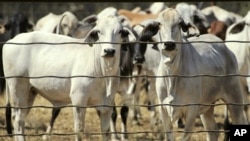Australian ranchers have welcomed the decision by the government in Canberra to lift a ban on live cattle exports to Indonesia. Australia suspended the trade a month ago when graphic video emerged of animals being whipped, beaten and slowly killed in Indonesian slaughterhouses.
Ranchers will now be able to apply for new export permits if they can prove animal welfare standards will be met in the Indonesian slaughter houses where the cattle are killed.
For some the lifting of the export ban has come just in time to prevent more financial hardship.
Kirsty Forshaw owns Nita Downs, a 500,000-acre cattle property 220 kilometers from Broome in Western Australia with her husband Damian. The couple bought the remote farm in 2005 and have 5,000 cattle.
“I feel really relieved because 24 hours ago we were really worried about which direction this was heading," Forshaw said, "and at least now we have got a start and we have something to aim for. So there is still a lot of work to do but, yeah, it is good to see things turning around.”
Ranchers across Australia have reported financial stress since the export ban was introduced a month ago. Some said they would be forced to shoot thousands of cattle if the lucrative trade with Indonesia was not reinstated because it was simply too expensive to keep them.
Near Broome, Kirsty Forshaw says money has become increasingly tight in recent weeks.
“I was starting to get a bit worried in the last few days actually because, sort of, the bills were coming in," explained Forshaw. "We still have to order a lot of diesel because that is how we pump water for our cattle for them to drink. You know, our fuel was getting low so I was worried about how we were going to pay for the next lot of fuel. We have been going through a lot of hay with cattle we have had in the yards which we ended up putting back out in the paddock.”
Northern Australia’s farming community has always prided itself on resilience and determination in the face of adversity, including drought and tropical storms.
With bills piling up, Forshaw says she intends to make sure the cattle she sells to Indonesia are not mistreated.
“Everyday we have something go wrong whether it is a bore generator breaking down or something like that," she noted. "So, but I tell you what we will be…taking a bit of ownership back onto this ourselves and I will be following through a lot of this stuff and I am hoping to get to Indonesia and have a look at things myself rather than just relying on other people to do it for us.”
Indonesia is Australia's largest live-cattle market, with exports worth more than $320 million annually. The government has yet to say when the trade can resume.
Indonesian officials have consistently denied claims of widespread animal cruelty in their slaughterhouses.
Australian Ranchers Welcome Lifting of Indonesia Cattle Ban
- By Phil Mercer




